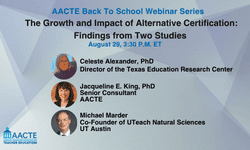
The Growth and Impact of Alternative Certification: Findings from Two Studies
In partnership with the Center for American Progress, AACTE has examined national and state trends among alternative certification programs run by organizations other than institutions of higher education. At the same time, researchers at the University of Texas, Austin have studied the impact of Texas’ reliance on alternatively certified teachers on teacher longevity and student performance. Together, these studies paint a rich–and concerning–portrait of how alternative certification is impacting the educator workforce. The authors will discuss their findings and suggest strategies for EPP leaders.
Jacqueline King is an independent consultant who works with K-12 and higher education leaders to improve student outcomes. She is also a collaborator with Education First consulting group. King has had a long career in education, including 15 years at the American Council on Education (ACE). She is the author or co-author of numerous reports, articles, and book chapters on college readiness, student financing of higher education, access and persistence in postsecondary education, student demographic trends, and trends in the leadership of higher education. She has authored several reports for the American Association of Colleges for Teacher Education, including Colleges of Education: A National Portrait. Her work has been featured on CNN and in national publications such as The New York Times, Time, USA Today, and the Washington Post.
Michael Marder is a professor in the Department of Physics, director of the Center for Nonlinear Dynamics, and a condensed matter physicist at the University of Texas at Austin. He received his bachelor’s degree in physics and mathematics from Cornell in 1982 and his PhD in physics from the University of California, Santa Barbara in 1986. He is co-founder of UTeach, a university-based secondary STEM teacher preparation program that began in 1997. In 2005, he wrote a white paper about the expansion of this program into other universities that foresaw the national replication of UTeach. Since that time, the UTeach program has expanded to 50 universities in 21 states and the District of Columbia. He oversees this effort as executive director.
Celeste Alexander serves as the director of the Texas Education Research Center (ERC). The ERC is a research and evaluation center that provides access to high quality, longitudinal data from the Texas PK-12, Texas higher education, Texas workforce, and other data for the state of Texas. The data now spans over 30 years and continues to grow annually. The ERCs mission is to maintain a longitudinal data system for the State of Texas; and to provide social scientists and other researcher’s access to the ERC database to study and analyze significant questions to improve educational policy, educational outcomes, and labor outcomes
As director and a research scientist, Alexander manages and expands Texas’ most comprehensive State Longitudinal Data System. In addition, she has become an expert in the growing field of longitudinal data systems, fueling academic research with her knowledge of quantitative designs, data management, security, and analytic experience while actively participating in the research process. Alexander currently manages many complex projects involving multiple stakeholders and oversees the rapid growth of the UT Austin ERC.
She has over 40 years of combined experience in child development, psychology, education, research, and evaluation. Her work in education focuses on policy and practice, educational outcomes, and labor outcomes. Alexander serves on the ERC Advisory Board at the state level, which monitors data use and FERPA compliance.
